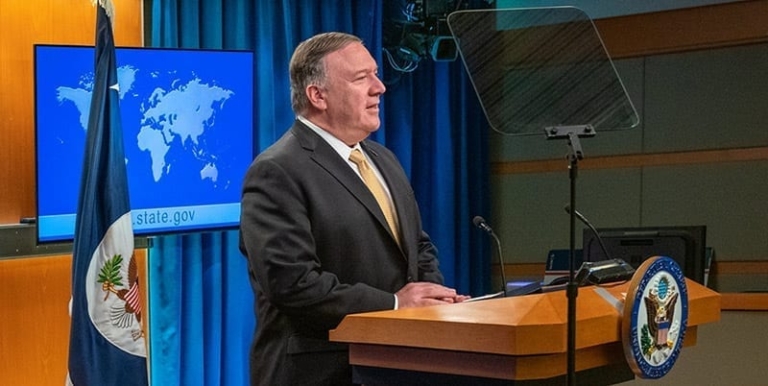
In a hastily arranged press conference on November 18, 2019, Secretary of State Michael R. Pompeo declared that the “Trump administration is reversing the Obama administration’s approach towards Israeli settlements” and will henceforth consider that “The establishment of Israeli civilian settlements in the West Bank is not per se inconsistent with international law.” The statement implies, among other things, the US rejection of United Nations Security Council Resolution 2334 of 2016 that characterized Israeli settlements as a “flagrant violation” of international law. Pompeo justified Washington’s reversal of the longstanding American policy vis-à-vis Israeli settlements as a recognition of “reality” on the ground aimed at strengthening “the US’s position ahead of the expected release of its Mideast peace plan, authored by Trump’s son-in-law and senior adviser Jared Kushner.”
The reaction to the Pompeo statement at home and abroad was immediate and predictable.
Mired in his own political and legal crises, Israeli Prime Minister Benjamin Netanyahu immediately welcomed the policy shift in Washington, characterizing it as a “huge achievement” that “fixed a historic wrong.” Speaking on behalf of the Palestine Liberation Organization (PLO), PLO Executive Committee member Hanan Ashrawi responded that “The announcement made by US Secretary of State [Pompeo] has no legal validity.” Ashrawi explained that “The US neither has the right nor agency to rewrite international law and deface the rules-based international order.” In a separate press release issued by the PLO Negotiations Department, lead negotiator Saeb Erekat insisted that “International law and system clearly define the illegality of Israeli settlements.” He accused the Trump Administration of “demonstrating the extent to which it’s threatening the international system with its unceasing attempts to replace international law with the law of the jungle.”
Throughout the international community, friends and foes alike viewed the US statement as ill-conceived and ill-timed with the propensity to inflict serious damage to the elusive search for just and lasting peace between Israel and the Palestinians—contrary to the incoherent and unjustifiably optimistic sentiment expressed by Pompeo. The Russian foreign ministry, for example, condemned the declaration of the US secretary of state and insisted that Israeli settlements are “illegal under international law.” Furthermore, US allies in Europe reacted swiftly by affirming that EU policy on Israeli settlements “is clear and remains unchanged: all settlement activity is illegal under international law and it erodes the validity of the two-state solution and the prospects for a lasting peace.”
The domestic reaction within the United States was equally critical. Several Democratic presidential candidates and members of Congress slammed Trump’s decision for fear of negatively impacting the search for peace in the region. Former Vice President Joe Biden echoed that sentiment by saying that “This decision harms the cause of diplomacy, takes us further away from the hope of a two-state solution, and will only further inflame tensions in the region.” Senator Bernie Sanders (I-Vermont) accused President Trump of “isolating the United States and undermining diplomacy by pandering to his extremist base.” Senator Elizabeth Warren (D-Massachusetts) went a step further by committing to reverse the policy if elected in 2020.
Within the American Jewish community, Americans for Peace Now (APN) took the lead by accusing the Trump Administration of “giving a green light to further settlement expansion and even to formal Israeli annexation of the West Bank.” APN joined its Israeli affiliate in reminding Secretary Pompeo that “No statement will change the fact that the settlements were constructed on occupied territory, in violation of international law, and are an obstacle to peace.” Christian Evangelical Zionists, on the other hand, welcomed the policy shift by the administration. Jack Graham, pastor of the Prestonwood Baptist Church in Plano, Texas, said the Trump Administration “once again has demonstrated why evangelical Christians have been unwavering in their support.”
The diplomatic proclamation by Secretary Pompeo was not surprising in terms of substance, although it was somewhat unanticipated in terms of timing. After all, the Trump Administration is a veteran at granting Israel substantial concessions without reason or rhyme, and more profoundly, without political reciprocity. Since his inauguration in January 2017, the 45th president of the United States has expressed his biased support for Israel by recognizing Jerusalem as its capital, moving the US embassy from Tel Aviv to Jerusalem, defunding Palestinian aid, closing the PLO mission in Washington, and acknowledging Israeli sovereignty over the Golan Heights, occupied from Syria in 1967. Therefore, declaring Israeli settlements as “not per se inconsistent with international law” in American eyes is only the latest item on the administration’s endless list of undeserved US political and economic largesse toward Israel.
In terms of timing, it is quite puzzling to analysts as to why the administration decided to make the policy shift at this specific time. According to Aaron David Miller of the Carnegie Endowment, “The reasons for the precise timing of this statement are unclear.” Throughout the years, successive US administrations have reassessed Middle East policy positions as a favor to Israel or to American groups lobbying on its behalf; on a few occasions, ongoing negotiations between the parties required Washington to tweak its policies to influence the outcome one way or the other. But these factors are not in play at this time. Miller is quite correct in blaming the Trump overture on domestic factors in both the United States and Israel—namely, appeasing the evangelical vote prior to the 2020 election and throwing a “potential lifeline” to Netanyahu days before his indictment for bribery, fraud, and breach of trust.

